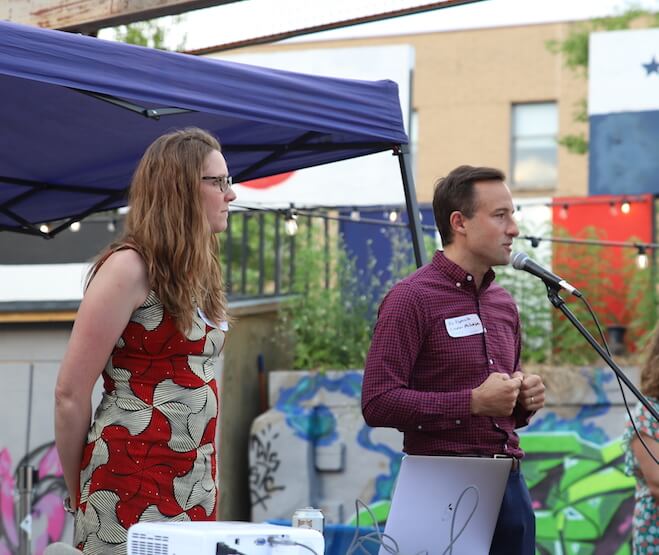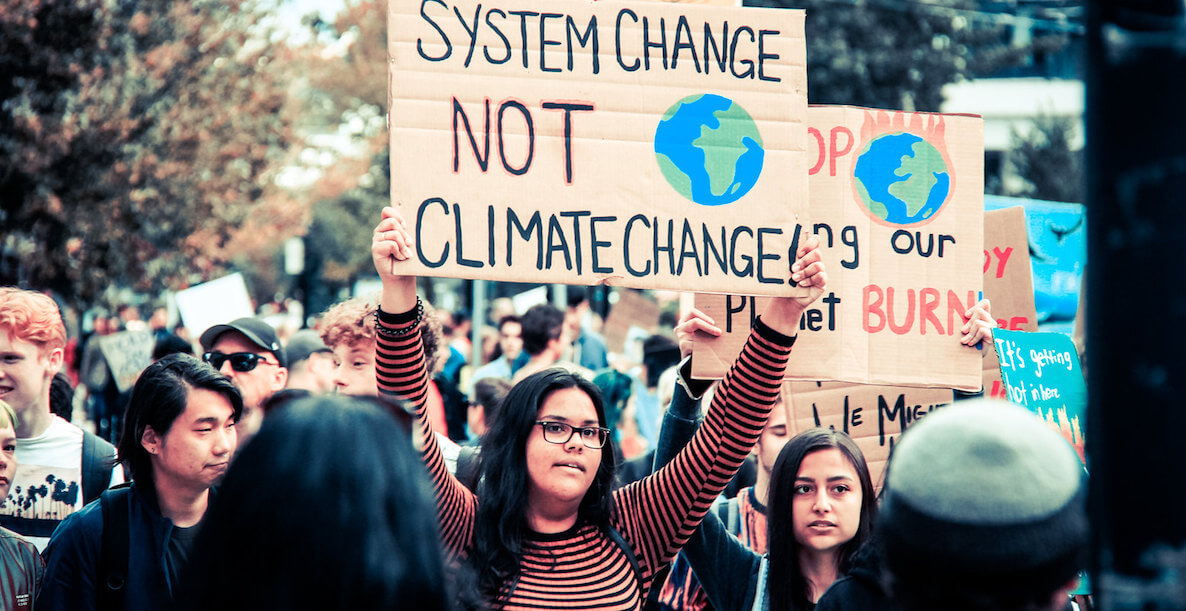Last August, while trash piled up on city streets, Nic Esposito, the former head of Mayor Kenney’s Zero Waste and Litter Cabinet, penned a piece in The Citizen with ideas for how to solve Philly’s waste problem.
In addition to laying out proposals to reduce food waste, develop more efficient trash pickup routes, and enhance the Streets Department’s performance evaluations, he alluded to an all-encompassing idea that goes far beyond just cleaning up the streets: “An economy will not survive in the 21st century with the failed make-take-trash model. We need a circular economy that responsibly manages resources while providing for all.”
Esposito’s Citizen piece caught the eye of Samantha Wittchen, a sustainability consultant and former consultant to the City of Philadelphia’s Recycling Office. Wittchen was already familiar with Esposito: A year earlier, in fact, they had gotten into a back-and-forth in Grid magazine over the City’s recycling woes.
In a perfectly circular economy, landfills would fall off the map; materials would either be biodegradable, or repurposed and reused as new products.
This time, though, rather than launch into another debate over ideas, the two sustainability experts teamed up to create their own solution: Circular Philadelphia, a nonprofit that aims to create a zero-waste city by combining greening efforts with economic growth.
“When we reconnected, we both saw that there were a lot of issues still going on, and certainly the pandemic shone a light on these issues—like how the city was managing its waste and materials. It became clear that the time was now or never to take action,” Wittchen says.

What is a circular economy?
A “circular economy” takes nature’s own energy cycle as its blueprint: A plant grows with the help of water, soil and sunlight; it’s eaten by one animal as a source of energy; that creature is eaten by another; the cycle goes on. All the while, those insects’ and animals’ waste—their excrement and then their decaying bodies after they die—goes right back into the soil and biodegrades as nutrients for future plants. The units of energy have shifted form, but they’ve been there all along. Nothing’s wasted.
Advocates of the circular economy aim to replicate this sort of energy cycle even in the context of our modern, industrial, technologically advanced economy. Instead of a “linear economy,” whereby a product is produced, used and then disposed of, a circular economy would explicitly design and manufacture products that have continued life beyond their original purpose. In a perfectly circular economy, landfills would fall off the map; materials would either be biodegradable, or repurposed and reused as new products.
This ideal end state of maximal reuse helps clarify the primary problem that the circular economy aims to solve: Waste. And in Philadelphia, there’s plenty of work to be done in reducing waste.
According to statistics from the Energy Justice Network, Philadelphians dispose of about 1.4 million tons of waste each year—nearly a ton per person—about 80 percent of which is incinerated or goes to landfills, Wittchen says. Of that, according to data from the Streets Department’s solid waste management plan, food waste accounts for roughly 16 percent, paper for 14 percent, and about 20 percent is recyclable material. (Though as Esposito adds, “how much is actually recycled is another story”).
MORE ON TRASH AND LITTER IN PHILADELPHIA
“Today, we extract materials, manufacture them into marketable products, sell them, consume them, and throw them out,” Esposito says. “Everyone keeps passing these things off until they become trash.”
A circular economy is different. As the Circular Philadelphia website puts it, the circular economy “reuses materials as long as possible, shares resources, designs out waste, and regenerates natural systems. It reimagines the old system as a continuous loop that transforms how we design, make and use everything.”
At least one example of this already exists in Philly: Rather than throw away the scraps from the clothing they manufacture, local designer Lobo Mau has been sending the leftover fabric to fellow small business owner Tim Eads, who turns them into rugs he sells through his business. In so doing, the two businesses are attacking one of the biggest polluters in the world: the textiles industry.
“It’s a pretty crazy thing to make a bunch of clothes, put them in stores, and hope they sell,” says Esposito. “But if you’re able to do stuff like repurposing the clothing fabric into other materials, it can create roughly six times the amount of jobs.”
Circular Philadelphia’s three-prong approach
Circular Philadelphia’s efforts can be divided into three buckets: policy advocacy, education and outreach, and market transformation.
Public advocacy
Wittchen noted that Circular Philadelphia is pushing policymakers to pass and implement “policies and regulations that are geared towards removing the friction faced by businesses trying to engage in circular economic practices.”
What does this look like in practice? They point to their recent policy victory on behalf of reusable containers in Philly restaurants. Representatives from Tiffin, an Indian restaurant with locations scattered all throughout the city and surrounding suburbs, had approached Circular Philadelphia regarding the City’s prohibitive regulations on reusable containers in restaurants; they required businesses that wanted to offer reusable take-out containers to seek a variance from the Department of Health, and that cumbersome, lengthy process cost $250.
To many businesses, such as Tiffin, this presented a major barrier, so Circular Philadelphia negotiated with the Health Department to change the rule. As of early July, the variance rule was lifted. That, Wittchen says, is an example of Circular Philadelphia’s drive to level the playing field for environmentally-friendly business practices. Now, they plan to hold a webinar for businesses explaining the relaxed reusable container regulations.
Education and outreach
The organization is working to explain to consumers what the circular economy is and how it can positively affect their lives—and pocketbooks. In principle, it can provide high-quality products at lower prices for consumers, but it also asks something of consumers: to reimagine their relationship to the things they own.
Instead of owning something, using it and disposing of it, consumers are asked to understand their ownership more like a form of stewardship: You own the good and the materials that comprise it, and take care of it before passing it on to its next phase of repurposing and production.
Market transformation
One of the advocates’ greatest challenges is pushing back against the notion that sustainability and material prosperity are at odds with one another. And that’s where market transformation comes into play, argue Wittchen and Esposito.
For now, they are focusing on three markets in particular: the built environment, food systems and textiles. There is already work and advocacy being done in these realms by businesses and activists, upon which Circular Philadelphia is hoping to build.
Environmental progress can also mean economic growth
A true circular economy is about more than just the environment; it’s also about economic growth, something often missing from conversations about climate change. Some environmentalists are hostile to the capitalist system, which they see as damaging to our planet’s health. But circular economy advocates don’t want to throw the baby (prosperity) out with the bathwater (waste and pollution). They’re trying to reimagine our economy in a manner that universalizes sustainability—instead of letting it be a one-off goal of a few companies here and there—without forsaking any of our material gains.
That matters, especially in Philadelphia, with a 25 percent poverty rate, where the poorest neighborhoods are also the hottest, with the highest amount of pollution. Plenty of citizens are supportive of “going green” in different ways, but don’t have the luxury of getting behind environmentally friendly policies and practices that inhibit growth and thus exacerbate poverty.
Circular Philadelphia seeks to square this circle: creating a greener Philly, yes, but also a richer one. Take the example of food waste. Wittchen and Esposito stress that Philadelphians waste roughly 40 percent of their food each year. But if that waste were part of a composting process, it could translate into work for more people. “Collections, processing into compost and getting the compost back to market is a much more jobs creating endeavor,” Esposito argues.
“It’s a pretty crazy thing to make a bunch of clothes, put them in stores, and hope they sell,” says Esposito. “But if you’re able to do stuff like repurposing the clothing fabric into other materials, it can create roughly six times the amount of jobs.”
This touches on some of the ancillary benefits that Wittchen and Esposito believe could flow from circular business practices and public policy reforms—namely, more jobs and more dollars in Philadelphians’ pockets. Esposito puts it bluntly: “We’re not asking people to go out of their way and lose money.”
With their new venture, Esposito and Wittchen are working to translate research regarding the circular economy concept by institutions like the Ellen MacArthur Foundation into tangible action. The Foundation has carried out research on municipalities already adopting circular principles, like the Swedish City Malmö’s work in furniture procurement, and the successes had and hurdles faced in advancing circular principles by clothing producers.
“We want to build on the thought leadership that’s out there, but also to turn that thought leadership into action, and develop some models on how to make these principles work in practice in a city,” said Wittchen.
So far, nearly 50 individuals, businesses and organizations have signed on as Circular Philadelphia members, providing substantial initial funding. Wittchen and Esposito plan on expanding their funding streams going forward by entering into sponsorships and garnering support from foundations. They also will be contracting with businesses and municipalities to bring in additional funds. For now—while they incorporate as a 501c3—Circular Philadelphia is operating under the fiscal sponsorship of Sustainability Nexus. Neither Wittchen nor Esposito is a full-time employee, but they plan on continuing to build the organization and hiring more staff in the future.
Meanwhile, they are keeping track of their policy wins and the number of businesses that adopt circular principles. They’re taking a “tactical approach,” working bit by bit, policy by policy, business by business, to bring Philadelphia’s production and consumption realities closer to their circular ideals. As their “Circular Scavenger Hunt” makes clear, there are already a number of businesses in the Philadelphia region committed to sustainable, circular principles.
In Esposito’s eyes, there’s no other choice: “Our economy is changing, whether we like it or not. The train has left the station.”
RELATED




